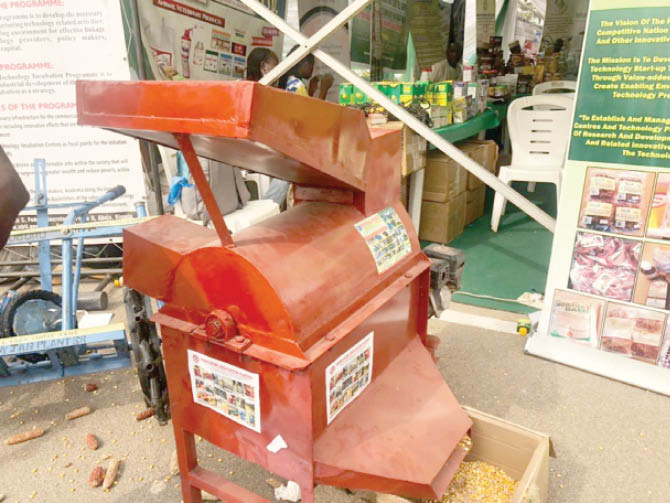Failure to promotes local fabricators slows agric mechanization drive
At the just concluded science and technology expo in Abuja, Nigerians, including secondary school students, showcased their inventions. Some of these inventions, if promoted, will drive the country’s agricultural mechanization. However, it seems focus is more on imported machines at the expense of the talents that lay waste in the country while the country buys […]

Some of the Nyalwat technologies
At the just concluded science and technology expo in Abuja, Nigerians, including secondary school students, showcased their inventions. Some of these inventions, if promoted, will drive the country’s agricultural mechanization.
However, it seems focus is more on imported machines at the expense of the talents that lay waste in the country while the country buys small handheld machines from China and India at the expense of local producers.
- This money-spinning intelligence trade with bandits…
- How bandits killed 65 ‘Yan-Sa-Kai members, soldiers in Kebbi
At the expo, Daily Trust caught up with some of these inventors with products that will not only reduce drudgery but also lessen food wastages at a time population expansion and climate change pose more problems.
Mr Josiah Sati Nyalwat, Chairman of Fabricators Association Plateau and the Managing Director Nyalwat Technical Works who led other fabricators to showcase their works, explained how painful it was to see the country importing what can be produced at home.
In a chat, he explained some of the machines he and his other contemporaries, under the technology incubation Centre, have just invented to solve the problem of Nigerian farmers.
He began by explaining what led him into this area.
“In my local community, we discovered that the major problem farmers have is the issue of machines. They produce food through manual method of farming. They don’t have machines to thresh and process these agricultural products. We saw this as a great challenge, so we decided to make the multipurpose thresher that will be able to solve this problem. The thresher is expected to enhance the productivity of the farmers, and also reduce food wastage.
“The threshing machine is made in such a way that it can take less energy but high output, and then, as you can see here, the machine is capable of threshing up to 10,000 kg (10 tons) within one hour and the farmers are already using the machine. The machine is tested, perfected and is working very fine with the farmers,” he told Daily Trust.
The parts are available because they are locally fabricated. No part is imported and they are cheap compared to import ones.
He multipurpose thresher costs N250,000 but an imported similar product will sap N3 million
“This machine will serve the farmer for more than 10 years. I don’t think you are going to have any problem because all the parts are very rugged. We make it according to the climatic condition of Nigeria, with very strong parts. And what makes our machine different from others in the market is the strength of the material and also the arrangement of our beaters with bearings as well as the high quality. You don’t need to lubricate the hoppers.
“The way we made the machines, people with disability can operate it, women can operate it. We also made it in such a way that students can come and learn. Students from technical schools and universities – and we encourage the students to carry out research on this invention so that when they go for their final year project, they can add some value to it so that when they go to their villages, it will help the rural farmers in their communities,” he said.
Fabricators from other states have also developed planters for maize, rice, and all the grains to ensure uniformity in space and depth.
Major challenges
“The major challenge we fabricators here in Nigeria face is the lack of equipment. We are in a digital world now and we need to be using CNC machine that is Computer Numerical Control so that our machines can be acceptable. It will help us produce parts according to internationally acceptable standard. But, unfortunately till now, we have not established any factory or any workshop where fabricators can go to design their machines and parts very easily.
“I want to appeal to the federal government to look at us with human face. They should be able to either provide funds for us or buy the CNC machines for us at any arrangement so that we can operate easily,” Mr. Nyalwat said.
The chairman said getting funding from banks and any government institution is very challenging and cumbersome.
“Since 2016, I have been looking for an intervention from the bank (NIRSAL) till today, we couldn’t get any. This is very discouraging. Some applied for N25m, they got N1m. What will N1m do to a fabricator? So, I’m calling on the federal government to take fabrication seriously because these farmers, food processor and households depend on fabrication but funding is a major issue,” said Josiah.
